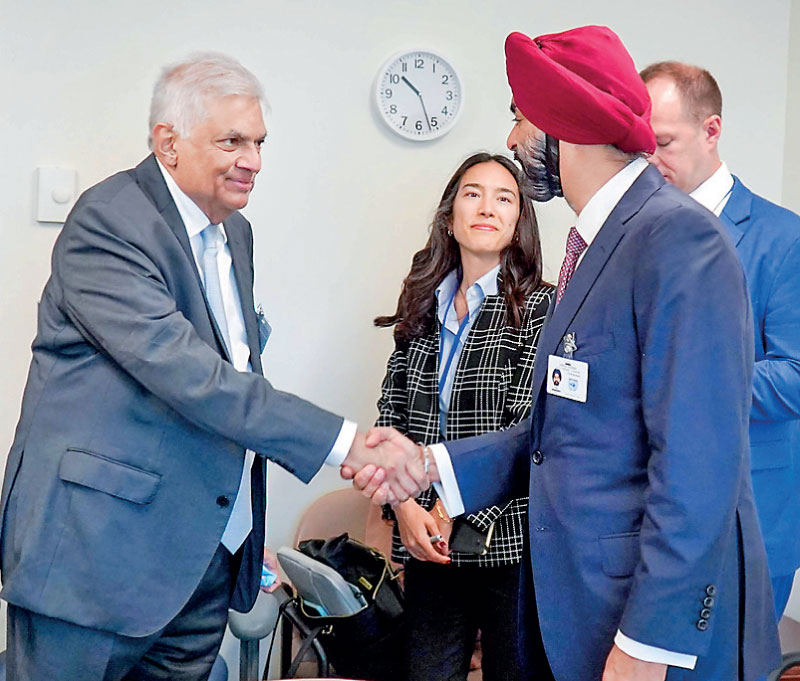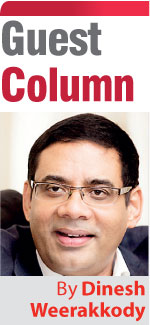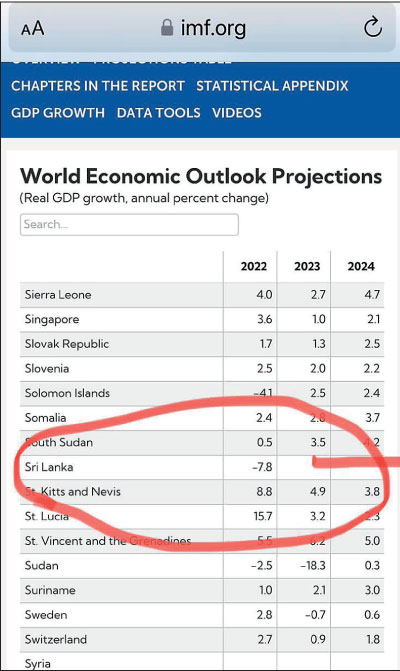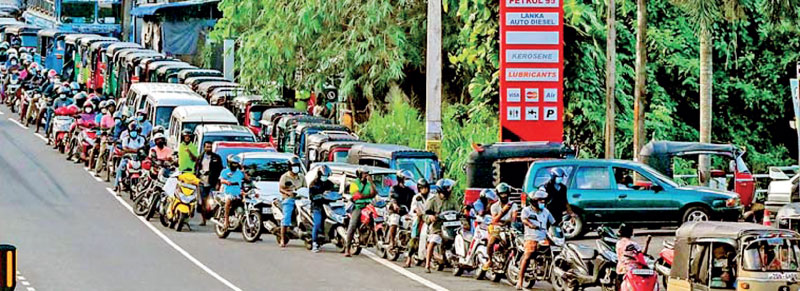Thursday Feb 12, 2026
Thursday Feb 12, 2026
Friday, 13 October 2023 00:20 - - {{hitsCtrl.values.hits}}

Ranil with World Bank President Ajay Banga
 The President’s viral video clip with the German television network DW unfortunately resulted in avoidable controversy and drew sharp criticism from certain politicians. For example Dr. Harini Amarasuriya took to twitter, stating, “Hopefully after Ranil Wickremesinghe’s disastrous interview with German TV, people will stop equating English fluency with intelligence, competence, and statesmanship.” The Bishops Conference also jumped onto the bandwagon to make a statement supporting Cardinal Malcom Ranjith. Opposition leader Sajith Premadasa said in Parliament that it is a grave sin to create division between religious leaders and justice should be done to the Easter victims without doing such a thing.
The President’s viral video clip with the German television network DW unfortunately resulted in avoidable controversy and drew sharp criticism from certain politicians. For example Dr. Harini Amarasuriya took to twitter, stating, “Hopefully after Ranil Wickremesinghe’s disastrous interview with German TV, people will stop equating English fluency with intelligence, competence, and statesmanship.” The Bishops Conference also jumped onto the bandwagon to make a statement supporting Cardinal Malcom Ranjith. Opposition leader Sajith Premadasa said in Parliament that it is a grave sin to create division between religious leaders and justice should be done to the Easter victims without doing such a thing.
Some analysts are surprised at the importance given to this interview. It was not a policy statement by any stretch of imagination and was at best, a pushback by a head of state against spurious allegations and the internationalisation of a purely domestic and tragic event. Even the detractors of the President would have taken the same if not an even more aggressive stance in that situation. Surprisingly however the President who is generally very astute when handling international media lost his cool in an effort to protect the dignity of Sri Lanka.
Obviously the officials who arranged the interview did a poor prep or did not know the value of good preparation. The controversy was totally unnecessary. Unfortunately most bureaucrats in the Government are not politically astute nor savvy to understand the meaning of national dignity and the dignity of the presidency.
 President Ranil
President Ranil
The interview has sparked an avoidable debate and polarised opinions, both domestically and internationally, regarding Sri Lanka’s stance on the Easter Sunday attacks and the need for transparency and accountability in addressing the Easter Sunday mayhem. For the President the next instalments of the IMF loan and the EU’s GSP plus tax relief is something that he is fully focused on as the Finance Minister, a delay of which can be to the detriment of the country and its people. Some argue that if the majority in Parliament are unwilling to follow the reformist path the President wants and needs to follow, he should consider dissolving such a uncooperative Parliament and get a brand new set of progressive MPs to work with him to lead Sri Lanka to the IMF’s second tranche and more, and finally to recovery.
Being Ranil
I may be accused of being biased. I am anyway offering my service to Government pro bono and I can without fear or favour, call a spade a spade. Therefore to me there is very little doubt that navigating through the tumultuous waves of a financial and political crisis which Sri Lanka was forced into in 2022, only a man of Ranil’s maturity, experience and skill could have helped Sri Lanka to come out of a somewhat self-inflicted bankruptcy. When President Ranil Wickremesinghe assumed the Presidency the country grappled with the most formidable fiscal and administrative crisis since independence in 1948. There were mass demonstrations triggered by 12-hour power outages and massive shortages of fuel and gas. President Ranil Wickremesinghe deftly succeeded in bringing back normalcy by addressing the economic crisis very clinically.
Though some claim credit and give credit to others, it was the President who remained focused on the critical issues and addressed them headlong, despite the huge fallout. Unlike any other leader in the past he talks of the climate impacts that Sri Lanka will face and how we can address them. He has taken this issue overseas to the international community.
Way forward for Sri Lanka
The biggest challenge he faces is to increase State revenue and reduce the cost of the Government. We need a smart military, not a bloated top heavy military. We have lived for decades with consistent overestimation of revenue, which typically results in pressure being applied to enhance revenue collections via administrative actions, which can result in deviations from tax policy and collection options, creating an environment conducive to subjective actions by tax assessors and custom officials, this has resulted in significant tax evasion and duty evasion.
Also, expenditure allocations in the budget are not scientifically aligned with real cost structures; this results in ad hoc adjustments during the budget year, where associated approval requirements create huge delays. In addition, unrealistic expenditure plans in budgets often create situations whereby payments are rationed by the Finance Ministry due to a lack of liquidity, creating a situation in which suppliers are required to go after key bureaucrats and politicians to get their payments prioritised. This has resulted in creating a government within a government.
The message to the Government is now clear. IMF wants proper governance procedures and sound institutions. Sri Lanka stands at a critical juncture, facing a multifaceted economic and financial crisis that demands a comprehensive economic and political strategy for recovery. This requires a person with solid experience and professional competence and can speak the world language fluently. Whilst I agree one must not equate English fluency with intelligence, competence, and statesmanship, as suggested by Harini, the language proficiency is a must and that coupled with experience and education certainly makes a very potent combination for success.
However, the President needs to stay focused on the critical issues without getting sidetracked; that will certainly help Sri Lanka to come out of the crisis as a refreshed country. Going forward however the President certainly does not need any new controversies.

References:
https://www.ft.lk/top-story/Fuel-queues-get-longer-as-Sri-Lanka-dries-up/26-736153
https://www.imf.org/en/News/Articles/2023/09/27/tr092723-press-briefing-on-sri-lanka